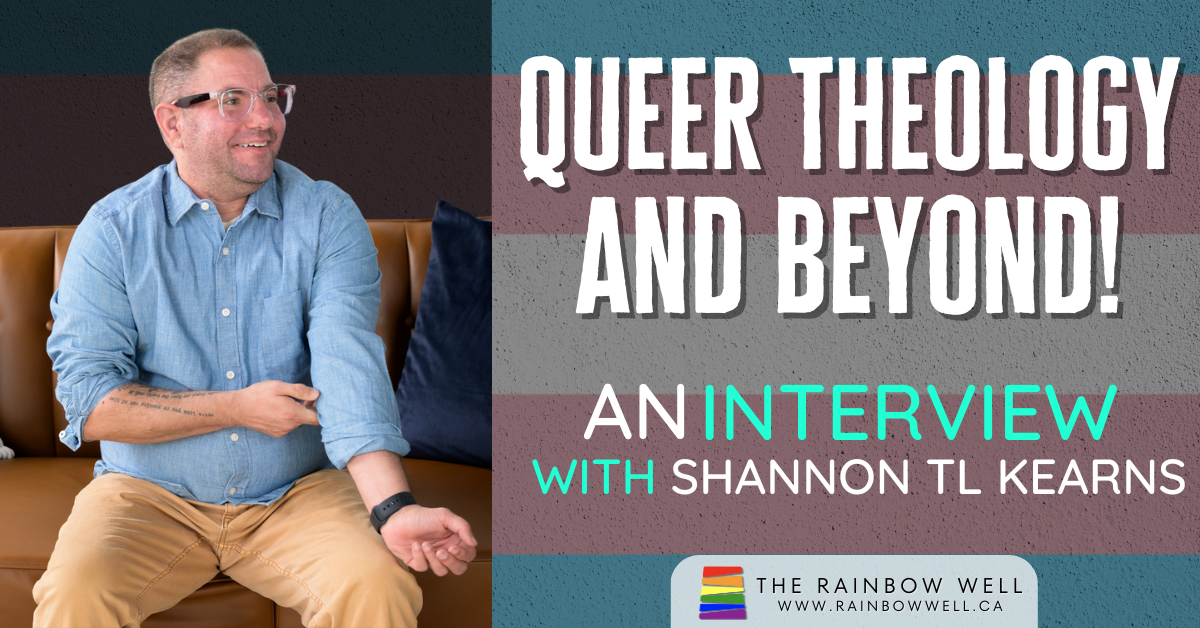Queer Theology & Beyond: An Interview With Shannon TL Kearns

One of the best parts of my work here at The Rainbow Well is getting to connect with amazing people doing amazing work. Shannon TL Kearns is no exception. A remarkable storyteller, Shannon’s life is a journey from a fundamentalist evangelical upbringing in a rural community to becoming the first openly transgender man ordained in the Old Catholic priesthood. A playwright, screenwriter, and author, co-founder of QueerTheology.com, he is also an ordained priest.
His work, including his first book “In the Margins: A Transgender Man’s Journey With Scripture,” and his award-winning plays and scripts, delves deeply into the transformative power of story and its ability to create meaning. Here is my interview with Shannon TL Kearns. I hope you enjoy it as much as I did:
Jamie Arpin-Ricci: The power of storytelling and art are central to your work. How have they been important, especially in your journey around faith, gender, and sexuality?
Shannon TL Kearns: There is something about a story that lowers people’s defenses, helps to increase empathy, and opens windows into other ways of being while also helping people to feel seen and less alone. Because of the power of story, it has been the most effective tool in my ministry and activism. Stories change people. I have experienced that people can (and often want to) argue with facts and figures, but they are less likely to argue with stories so storytelling is more effective when working for change.
Stories allow us, too, to envision new ways of being and to consider what it could feel like to live into a new world. We need stories to help us dream better dreams, to imagine new ways of being. This is powerful stuff.
JAR: How does being playwright offer you unique opportunities to tell stories?
SK: Theatre is a lot like church: We gather people together in a room, in person, to tell stories that help us make sense of life and figure out our place in it. This impulse informs both my ministry and my theatre work. There’s something powerful about gathering together in the same place with people, with seeing real bodies on stage in front of you breathing and crying and laughing, to feel the bodies on either side of them laughing and breathing, it’s a holy space. I think there is a real beauty in theatre as a space to work things out with other people. Theatre is also a space of honesty, a space to wrestle with big ideas and big questions. Sometimes in theatre I can say or ask things that there isn’t an openness to in the church.
JAR: Your book “In The Margins” directly addresses Scripture. For many of us who are 2SLGBTQIA+, the Bible has often been used as a weapon. How do you see and relate to the Bible? What do you wish people could see and experience when they read Scripture?
SK: I see the Bible as a beautiful library of books written by real people in real places during real times trying to make sense of their relationship with the Divine, with each other, and with themselves. It’s a record of people struggling, asking questions, wrestling, and messing up. It becomes an example for us, too, of what it looks like to try to figure out how to live and to be in right relationship with others. And, for better and worse, for those of us who call ourselves Christians or want to follow in the way of Jesus, it is THE record of the movement we belong to. We each have to decide what our relationship to this guiding text is going to be.
In my experience, learning to read Scripture well (meaning bringing ourselves to the text, learning about historical and political context, learning from scholars and theologians, etc.) opens up so much goodness. When we can approach the text as it is (not as we want it to be, or as we were taught it was) it allows us to see things we might have missed otherwise. I want queer and trans folks to be able to reclaim the Bible as a source of power, comfort, and liberation. Again, I go back to the stories. When we can move away from “what does the Bible say about X…” to “where can I find myself in this story?” we see in new ways.
JAR: Which books on faith, gender, and/or sexuality have been most important to you? Why?
SK: The first books I read when I was coming out that were meaningful were “Is the Homosexual My Neighbor? by Virginia Ramey Mollenkott and Letha Dawson Scanzoni and the trio of books by John J. McNeill (The Church and the Homosexual, Taking a Chance on God, and Freedom, Glorious Freedom) because they were about more than just learning to read the Clobber Passages, they were also about what queer and trans folks have to offer the church. That became a model for all of my work going forward. We are more than what we are not.
I was also deeply influenced by the work of Madeleine L’Engle who gave me a window into a spirituality that cared about beauty, and the work of John Dominic Crossan and Marcus Borg oriented me to understanding the historical and political context of the Bible which helped me to read it in a whole new way and unhook my theology from the theology of evangelicalism.
JAR: When you think of the concept of “allyship”, what is most important? What does it mean to practice allyship? Where have you seen the biggest failures of allyship?
SK: I’m actually not a fan of ally language. I think too often people make being “an ally” their identity which makes them resistant to feedback. I instead prefer people who want to work in solidarity with the queer and trans community. Being in solidarity is about action. What are you DOING to support queer and trans folks? What are you DOING to make the world (or your church or community) safer for us? That’s what really matters.
The biggest failures I’ve seen are people who put their own needs ahead of the community. It becomes about how they feel, about the the things they want, and not about how queer and trans people feel and the things we need. Or folks who are unwilling to listen to critique. The thing about working in solidarity with people is that you’re going to get it wrong sometimes. It’s not if but when. And the biggest question, then, is how will you respond when someone tells you you’ve messed up? Too often folks have gotten defensive (or even angry and hostile) when they’ve been corrected because they’ve put so much of their self worth into being “an ally” which makes them harmful and hurtful to the queer and trans community.
The other thing I’ll say, especially for churches, is that you need to keep learning. Many churches went through some kind of process to be open and affirming in the 90’s or early 2000’s and so proudly say they are affirming, but they haven’t kept up with the times! They don’t know how to actually welcome and affirm trans folks, they don’t know anything about identities other than lesbian and gay, they are using outdated language, etc. In order to continue to call your church welcoming and affirming you need to continue your learning. Continue to update your language, continue to host congregational trainings, continue to pay attention to the new needs of the community.
JAR: Are there any future books in your writing plans?
SK: Yes! I have a book coming out with Broadleaf Books in the spring of 2025 called No One Taught Me How To Be A Man: What a trans man’s experience reveals about masculinity as well as a youth devotional called Come and See to be published by Hodder Faith in the summer of 2025. And one more book that I can’t talk about yet.
JAR: We can’t wait! Thanks so much for sharing with us.
Resources my Shannon TL Kearns:
“In the Margins: A Transgender Man’s Journey with Scripture”
“Queers the Word: A 40 Day Devotional for LGBTQ+ Christians”
Queer Theology Podcast
Remember, this Pride month The Rainbow Well needs you! We are looking 40 people willing to commit to $25 a month for one year! That’s less than a dollar a day to put life-saving resources into people’ hands. Click here for details!

